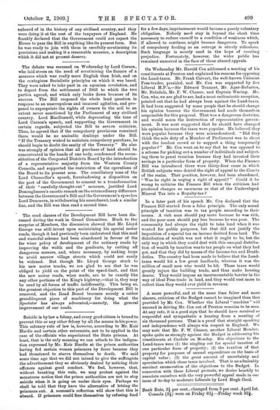The debate was resumed on Wednesday by Lord Curzon, who
laid stress on the need of scrutinising the finance of a measure which was really more English than Irish, and on the centagions Socialistic principles on which it was based, They were asked to take part in an agrarian revolution, and to depart from the settlement of 1903 to which the two parties agreed, and which only broke down because of its success. The Bill reopened the whole land question in response to an unscrupulous and immoral agitation, and pro- posed to expropriate the rights of owners to the soil to an extent never sanctioned by the Parliament of any civilised country. Lord MacDonnell, while deprecating the tone of Lord Curzon's speech, and supporting the Government in certain regards, subjected the Bill to severe criticism. Thus, he agreed that if the compulsory provisions remained there would be no amicable dealings under the Bill. "If the Treasury wished to maintain compulsory purchase, he should begin to doubt the sanity of the Treasury." He also was strongly of opinion that all purchase of land should be concentrated in the hands of one body, condemned the recon- stitution of the Congested Districts Board by the introduction of a representative majority from the Western County Councils, and supported the restriction of the operations of the Board to its present area. The conciliatory tone of the Lord Chancellor's speech, foreshadowing a disposition on the part of the Government to consent to a transformation of their " carefully-thought-out " measure, justified Lord Donoughmore's caustic remark on the extraordinary difference between the Government's Bill and the Government's speeches Lord Dunraven, in withdrawing his amendment, took a similar line, and the Bill was then read a. second time.


























































 Previous page
Previous page